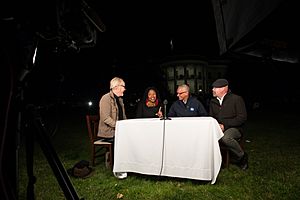Jedidah Isler facts for kids
Quick facts for kids
Jedidah C. Isler
Ph.D.
|
|
|---|---|
| Citizenship | United States |
| Alma mater | Norfolk State University (B.S.) Fisk University (M.A.) Yale University (M.S., Ph.D.) |
| Known for | Yale University's first African-American woman to earn a PhD in Astrophysics |
| Awards | Kavli Foundation Fellowship (2016), Ford Foundation Dissertation Fellowship (2012), National Science Foundation (2007) |
| Scientific career | |
| Fields | Astrophysics |
| Institutions | Vanderbilt University, Syracuse University, Dartmouth College |
| Thesis | In Like a Lamb, Out Like a Lion: Probing the Disk-Jet Connection in Fermi Gamma-Ray Bright Blazars |
Jedidah C. Isler is an American astrophysicist who studies some of the most powerful objects in the universe. She is also an educator and a strong voice for making science and technology fields more welcoming for everyone.
In 2014, Dr. Isler made history. She became the first African-American woman to earn a Ph.D. in astrophysics from the famous Yale University. Today, she is an assistant professor at Dartmouth College. Her research focuses on blazars, which are giant, super-active black holes. She studies the powerful streams of particles, called jets, that shoot out from them.
In 2020, she was chosen to be part of a team that helped prepare for a new presidential administration. She gave advice on matters related to NASA.
Contents
Early Life and Love for the Stars
Jedidah Isler grew up in Niagara Falls, New York, and later moved to Virginia Beach, Virginia. Her journey into astronomy started when she was about 12 years old. Her sister gave her a telescope for her birthday, and she fell in love with looking at the stars.
She knew she wanted a career in science. But when it was time for college, her family faced money problems that made it difficult for her to continue her studies. Still, she was determined to follow her dream.
Her college, Norfolk State University, didn't have an astronomy degree. So, she decided to study physics instead. She worked hard and graduated with high honors from a special program for minority students in science.
Path to a Historic Ph.D.
After college, Isler earned a master's degree in physics from Fisk University. She then joined a special program that helps women and minorities earn advanced degrees in STEM (Science, Technology, Engineering, and Math). This program helped her get into Yale University.
At Yale, she continued her studies in astrophysics. However, her time there wasn't always easy. She faced moments where people treated her unfairly because of her race. In one instance, a classmate treated her as if she didn't belong there. Despite these challenges, she focused on her work.
In 2014, she earned her Ph.D. from Yale. Her final research paper, or dissertation, was about blazars. It was so good that it won a special prize from the American Astronomical Society. Her role models include astronaut Mae Jemison and astrophysicist Beth A. Brown.
Career Studying the Universe

After getting her Ph.D., Dr. Isler continued her research at several universities, including Syracuse University and Vanderbilt University. She also received a special fellowship at the Center for Astrophysics at Harvard & Smithsonian.
So, what exactly does she study? Dr. Isler explains her work this way:
"My research focuses on understanding how Nature does particle acceleration. I use blazars –supermassive black holes at the centers of massive galaxies that "spin up" jets of particles moving at nearly the speed of light – as my laboratory... I piece together how and why these black holes are able to create such efficient particle accelerators and, by extension, understand the Universe a tiny bit better."
In simple terms, she studies blazars to understand how they shoot out jets of particles at almost the speed of light. By observing these jets using different types of light, from radio waves to gamma-rays, she learns more about how the universe works.
A Champion for Diversity in STEM
Dr. Isler is passionate about making science a better place for people of color, especially women. In 2015, she founded VanguardSTEM. It is an online series where she talks with other women of color in STEM fields. They share their stories and support each other.
She has given two popular TED Talks that have been viewed millions of times. In one talk, she discusses the challenges that Black women face in science and education. She pointed out that very few Black women in the U.S. had ever earned a Ph.D. in physics-related fields.
Dr. Isler has also appeared on TV shows like How the Universe Works and National Geographic's Mars series, where she explains amazing ideas about space.
In 2020, she helped organize #ShutDownSTEM. This was a day when scientists were asked to pause their work to learn about fighting racism and to support their Black colleagues.
Honors and Awards
Dr. Isler has received many awards for her work in both science and advocacy. Here are a few of them:
- Senior TED Fellow (2017)
- The Root 100 Most Influential African Americans (2016)
- National Geographic Emerging Explorer (2016)
- Kavli Fellow (2015)
- TED Fellow (2015)
- American Astronomical Society Roger Doxsey Dissertation Prize (2014)
- Ford Foundation Dissertation Fellowship (2012)
- National Science Foundation Graduate Research Fellowship (2007)
 | May Edward Chinn |
 | Rebecca Cole |
 | Alexa Canady |
 | Dorothy Lavinia Brown |

